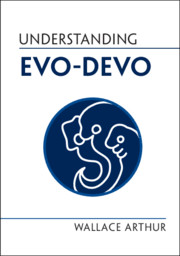Book contents
- Understanding Evo-Devo
- Series page
- Understanding Evo-Devo
- Copyright page
- Reviews
- Dedication
- Contents
- Foreword
- Preface
- Acknowledgements
- 1 What is Evo-Devo and Why is it Important?
- 2 Antecedents of Evo-Devo
- 3 Evolutionary and Developmental Essentials
- 4 Evo-Devo Essentials
- 5 The Evolution of Variations on a Theme
- 6 The Evolutionary Origins of Themes and Novelties
- 7 The Evolutionary Origins of Body Plans
- 8 Body-Plan Features and Toolkit Genes
- 9 Bringing It All Together
- Concluding Remarks
- Summary of Common Misunderstandings
- References
- Figure Credits
- Index
2 - Antecedents of Evo-Devo
Published online by Cambridge University Press: 29 April 2021
- Understanding Evo-Devo
- Series page
- Understanding Evo-Devo
- Copyright page
- Reviews
- Dedication
- Contents
- Foreword
- Preface
- Acknowledgements
- 1 What is Evo-Devo and Why is it Important?
- 2 Antecedents of Evo-Devo
- 3 Evolutionary and Developmental Essentials
- 4 Evo-Devo Essentials
- 5 The Evolution of Variations on a Theme
- 6 The Evolutionary Origins of Themes and Novelties
- 7 The Evolutionary Origins of Body Plans
- 8 Body-Plan Features and Toolkit Genes
- 9 Bringing It All Together
- Concluding Remarks
- Summary of Common Misunderstandings
- References
- Figure Credits
- Index
Summary
Although today we call the scientific study of the relationship between evolution and development ‘evo-devo’, neither that term, nor its longer counterpart ‘evolutionary developmental biology’, existed before about 1980. Yet the study of the relationship between the two great creative processes of the living world has a much longer history – effectively starting in the nineteenth century, the first century in which there was a well-articulated theory of evolution (first Lamarck’s, then Darwin’s). We generally refer to evo-devo’s nineteenth-century antecedent as ‘comparative embryology’. Although in the subsequent period from about 1900 to 1980 there were further studies of the relationship between evolution and development, there is no collective term for this endeavour, because mainstream developmental biology and evolutionary biology were largely separate undertakings during that stretch of time. The few biologists who tried to deal with the two together over this 80-year period might be described as mavericks. Each of them produced interesting bodies of work, but these did not really link up to form a scientific discipline.
Keywords
- Type
- Chapter
- Information
- Understanding Evo-Devo , pp. 19 - 36Publisher: Cambridge University PressPrint publication year: 2021

